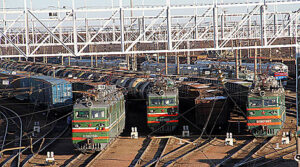
Different sanctions against Belarus and individual representatives of the Belarusian regime by the EU and the United States are nothing new. In fact, they are being introduced, partially cancelled and reintroduced since the dissolution of the parliament and the adoption of the new constitution in 1996. As a rule, these sanctions are not critical either for the Belarusian economy, or for the Belarusian authorities, or for bilateral relations between the countries. And many have long doubted the effectiveness of such an instrument of pressure on the Belarusian government.
The latest package of EU sanctions, according to experts, is also quite soft and, so far, does not pose a serious threat to the economy and the local political regime. Although it must be admitted that in the past few years, relationships between the EU and Belarus have been steadily improving and what is happening now is a significant rollback. A not less significant rollback is now taking place in the democratization of political life in Belarus.
In connection with this situation, it is worth mentioning two more interesting points.
First, the Belarusian regime failed to “sell” the EU and the US the idea of a “Russian interference in the elections”.
Since the beginning of the election campaign, Lukashenko has stated that the opposition candidates are protégés of the Russian capital and behind them are “puppeteers from Gazprom”, apparently hoping that the repressions against these candidates will not cause such a violent reaction from the EU and the US. Shortly before the elections, 32 Russian citizens, presumably fighters from one of the Russian private military companies, were detained near Minsk, after which the authorities accused unnamed Russian ruling circles of attempting to intervene by force.
We do not presume to judge how fair these accusations are against opposition candidates and Russian politicians. Let’s just note that the degree of police violence in the days after the elections was so high that Russian intervention did not manage to justify the harsh measures against the protesters. This argument was not accepted either domestically or abroad.
Secondly, practice shows that the European Union’s policy towards Belarus is not homogeneous. Against the background of the relatively soft policy of the “old Europe”, the very tough policy of the neighboring countries stands out: Lithuania, Latvia and Poland, which categorically do not recognize Lukashenko as the legitimate head of the state.
And the current severing of ties with Lithuania and Latvia is indeed very painful for Belarus.
In recent years, the Belarusian authorities have made colossal efforts to diversify the supply of raw materials and energy resources to Belarus (which are now mostly Russian), in particular, literally now, trial deliveries of American oil were to begin to flow through the ports of Latvia and Lithuania. A significant part of the export from Belarus also goes through the ports and railways of Lithuania and Latvia.
Now all these cargo flows are planned to be reoriented to Russia, which puts the Belarusian economy in strict dependence on one partner who can dictate its terms.
It is interesting that the reduction of the Belarusian transit, in turn, very painfully hits the economies of Lithuania and Latvia. The transit of goods from Belarus and to Belarus provides a significant share of the budget of these states, and it is Belarus that is now the main client for their ports and railways. So the economic losses on both sides of the conflict will be comparable.
Summarizing what has been said. Against the background of a rather soft and cautious policy of the European Union as a whole, which does not carry any noticeable threats to the Belarusian economy and government, a rather tough local conflict is formed between Belarus and the new EU countries – Lithuania, Latvia and Poland. And it is fraught with serious problems for all parties involved.
Companero Re
from Poligraf_Red – a Marxist group from Minsk
https://www.youtube.com/c/POLIGRAFRED.